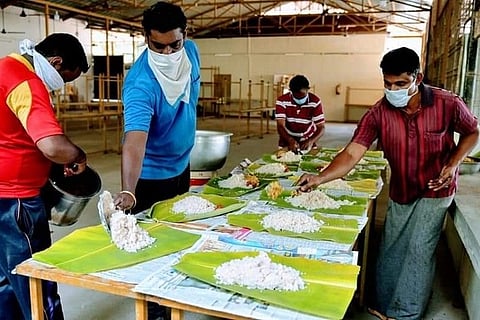

A little before four in the evening, Mahesh* has received an unpleasant call. All day long, he has been answering one of the phone numbers listed by the Thiruvananthapuram Corporation for the newly-launched community kitchen. Kerala Chief Minister Pinarayi Vijayan had announced on Wednesday that there shall be a thousand of these launching in the state, to take food to the needy and home-quarantined, during the coronavirus outbreak and the nationwide lockdown on account of it.
Kudumbashree, the state’s women community network, is working with local self-governing bodies (LSGs) to run the community kitchens, at least one of which is expected to function in every panchayat in rural areas and in every ten wards in urban areas. Funds have been set aside from the Rs 23.64 crore allotted for Kudumbashree in the financial year.
“We are very happy to cooperate with the LSGs and work as a team in this time of need,” says S Harikishore, Executive Director of Kudumbashree.
On Friday, Minister for Corporation, Kadakapmpally Surendran, inaugurated the community kitchen opened at the EMS Charitable Trust in Ulloor, Thiruvananthapuram. There would be 85 community kitchens opened in Thiruvananthapuram district by the following day, he said.
The community kitchens would be opened at convenient locations chosen by the panchayats or wards – like schools or auditoriums or Kudumbashree units.
Inside the community kitchens
Inside the community kitchen at Ulloor, Kudumbashree workers scatter about in white coats, masks and gloves, ready to serve. Edil Queen and Sreeja, heading the Medical College ward of 35 Kudumbashree members, say that even during other times they serve the people in the charitable trust. Now, of course, there would be more numbers.
Community kitchen in Ulloor
By 1 pm, all the lunch packets prepared at the Thycaud LP School – another centre identified for the community kitchen – are over. “We served about 300 people. There are orders for 600 meals in the evening,” says revenue inspector P Suresh Kumar, in charge at the school.
There would be three or four curries for meals, it is all simple and neat dishes, he says.
He shows the kitchen where Lekha and Chandrakumari, the two women employed at the school to prepare mid-day meals, are busy preparing for a lot more. They come at 5.30 am to begin work for breakfast and then lunch.
Chandrakumari cooks
“When it is just the children, it is about 250 meals a day. We are happy to serve so many more and we have the help of all these others,” says Lekha, pointing to the Corporation employees and voluntary workers, peeling onions and cutting vegetables. They are preparing a late lunch for themselves, after the other orders of the day had been dealt with. Jackfruit, collected from the school compound, is being cooked for an extra curry. Chandrakumari has no time to talk as she adds ingredients to the bursting mustard seeds on a little pan.
Corporation employees and volunteers at Thycaud community kitchen
Soon after this, they start preparing the evening orders.
Wards in charge
“Depending on the population and other aspects, there could be more than one community kitchen in a panchayat. The ward member or committee would be in charge of the kitchen in their respective ward,” says Dr PK Jayashree IAS, Director of Department of Panchayats.
The idea had been floated even before the spread of coronavirus, when the government wanted to have budget hotels in the state that could provide meals for Rs 25 a packet. “With the disease outbreak, this was changed to Rs 20 for those who could reach the community kitchen and Rs 25 for those we deliver at home. There is also a third group of people, listed by the government, for whom the food is provided for free – those in palliative care or the destitute and others,” says Harikishore.
Registrations in the morning
The orders need to be registered in the morning. Those who need food should call the respective helpline numbers released by the LSGs and register. People who take the calls, like Mahesh, would then intimate the respective unit about the numbers needed in each ward or panchayat.
“There would be different teams to pack the orders, to buy the raw materials, to deliver the food and so on,” says Suresh Kumar.
The raw materials are provided by the Corporation or the LSGs. “Supplyco provides the raw materials at ration rate and the Civil Supplies Department gives rice at Rs 10.9 per kg,” says Dr Shaiju, Thiruvananthapuram district Mission Coordinator of Kudumbashree.
It is also important to verify that the callers are indeed those who genuinely deserve the meals. “There are prank callers, callers simply asking questions. We need to deal with all of them,” says Mahesh.
But sometimes, they would still need to provide food in these cases. Suresh Kumar says that there is a plan to also involve residents’ associations so that some of the smaller needs can be taken care of within the locality. “We get calls asking to provide one meal to such and such home in one locality. For that one home, the delivery person has to go all the way. In such cases, the residents’ associations could take care of it if they collect a meal among themselves,” he says.
Kudumbashree director Harikishore says that within three days, nearly every panchayat would have a community kitchen, calling this is a fast and remarkable achievement.
(*name changed)